Venturing into the Void: The Risks and Rewards of Space Exploration
Overview of the Booming Space Economy and The Risks Along the Way
By Joseph Roberts
What is the Space Industry?
The space industry refers to the economic activities related to outer space, encompassing a broad range of activities from satellite communication to space tourism. In recent years, the space economy has seen explosive growth. More private companies have joined in a new space race led by SpaceX, Blue Origin, and Boeing.
The most mature part of the space industry is satellites and communications, where companies launch satellites for purposes including telecommunications, Earth observation, weather monitoring, and GPS services. Space exploration involves missions to other planets, moons, and celestial bodies, with both governmental agencies like NASA and private companies like SpaceX playing significant roles.
Then there's commercial spaceflight, where companies like SpaceX, Blue Origin, and Virgin Galactic are making strides in both cargo deliveries to the International Space Station (ISS) and space tourism. The ISS represents the current pinnacle of space stations and habitats, serving as both a research lab and living space for astronauts. However, in the future, we might see more commercial space stations and potential habitats on other celestial bodies.
An emerging field in the industry is space mining, where the aim is to extract resources from asteroids or other celestial bodies. This has the potential for extracting rare minerals or even water, which can be converted to rocket fuel. Space tourism, while still in its infancy, is quickly becoming a reality. Companies like Virgin Galactic and Blue Origin are working towards offering suborbital flights for tourists, with SpaceX planning for orbital and even interplanetary tourism.
Another aspect to consider is space defense and security. As nations come to rely more on satellites for defense, communication, and surveillance, there's a growing emphasis on ensuring the peaceful and secure use of space. Launch services, involving the process of sending payloads to space, are offered by companies like SpaceX, Arianespace, and United Launch Alliance.
Beyond the commercial aspects, a significant amount of research happens in space or about space. This includes studies to understand the universe, develop new technologies for space travel, and understand the effects of space on the human body. Lastly, as space activities expand, there's a need for infrastructure, both ground-based, like launch pads and tracking stations, and space-based, such as fuel depots or spaceports.
Risk and Concerns
Before reaching the level of optimism outlined above, there are some risks involved with the building of the space economy. One of the most pressing concerns in the space industry is space debris or "space junk." With an increasing number of satellites and spacecraft launched into Earth's orbit, the risk of collisions with existing debris intensifies. Such collisions can create even more debris, potentially leading to a cascade effect known as the Kessler Syndrome. This scenario envisions the density of objects in low Earth orbit becoming so high that collisions between them could trigger a chain of further collisions.
As the number of private companies entering the space sector grows, there's an urgent need for clear and consistent regulations. These regulations should ensure safety, prevent conflicts, and address potential liabilities. The varied regulatory approaches between countries can complicate matters. Economic viability is another concern. The current surge of interest and investment in space might not guarantee profitability for all endeavors. Over-enthusiasm in the sector can lead to over-investment, creating the potential for economic bubbles and subsequent market corrections.
Conclusion
The space industry has witnessed a rapid surge in recent years. With the entry of private companies like SpaceX, Blue Origin, and Boeing, the space race has been reinvigorated. This industry's expansion covers various areas including commercial spaceflight, space mining, space tourism, and space defense. The ISS stands as a testament to the achievements in space habitats and research. However, this growth is not without challenges. Space debris, or "space junk," poses a significant threat, with the potential of triggering cascading collisions in Earth's orbit. Additionally, as the industry grows, there is an increasing demand for clear, consistent regulations across nations to ensure safety, prevent conflicts, and address liabilities. Furthermore, the economic feasibility of certain space ventures remains uncertain. In conclusion, while the space industry's potential is vast, it's imperative to address these challenges to ensure a sustainable and safe future in space.
Sources
https://www.uschamber.com/space/how-the-space-industry-is-taking-off
https://www.grandviewresearch.com/press-release/global-space-technology-market

